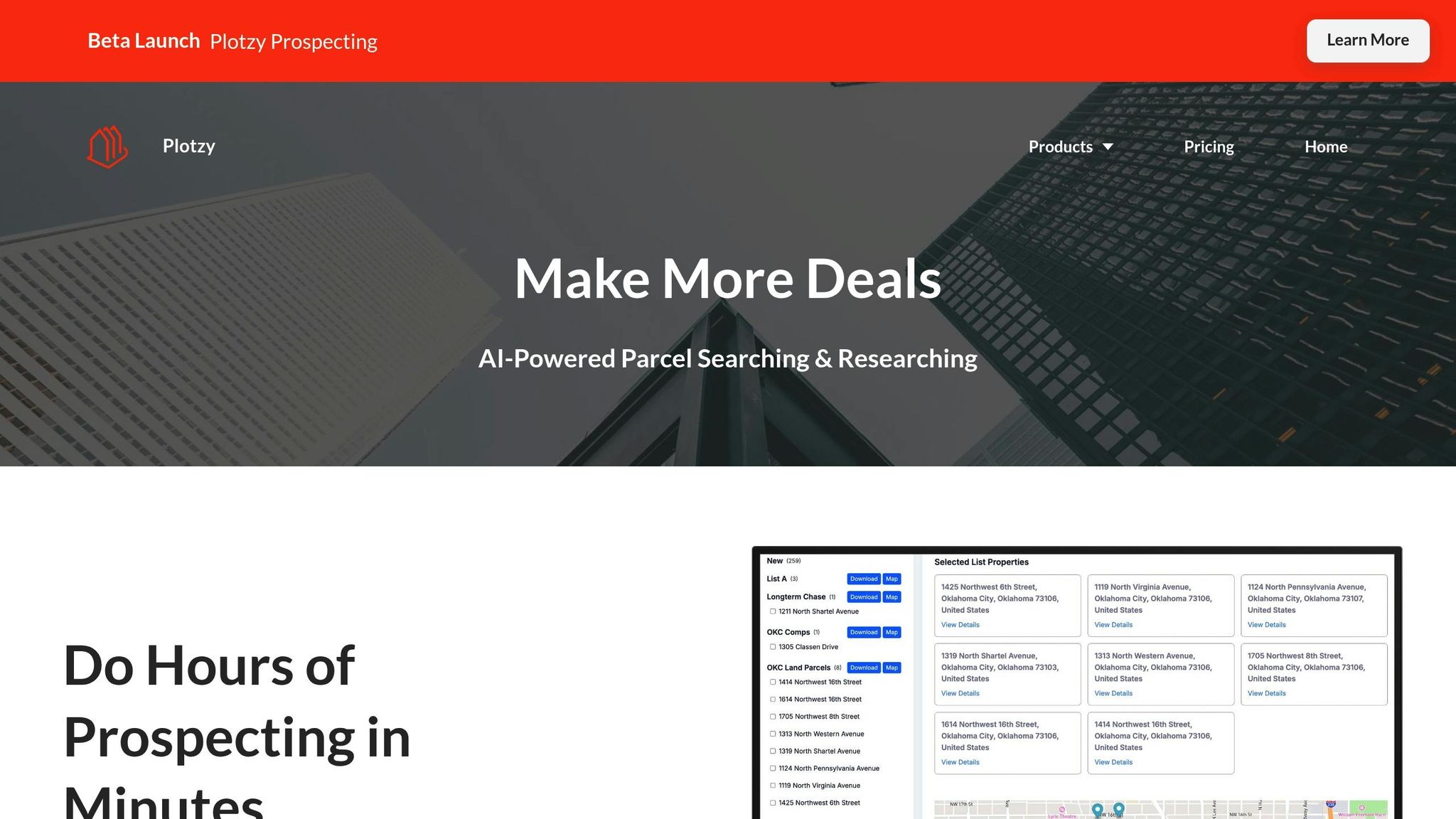Artificial intelligence (AI) is transforming commercial real estate (CRE) by automating complex tasks like property research, zoning analysis, and finding off-market opportunities. AI agents, advanced systems capable of learning and decision-making, are helping professionals save time, reduce costs, and make data-driven decisions. With AI adoption growing rapidly, tools like Plotzy streamline workflows and provide instant insights, making them indispensable for brokers, developers, and land teams.
Key Takeaways:
- AI in CRE: Automates tasks like zoning research, property analysis, and prospecting.
- Market Growth: AI in real estate projected to grow from $222.65B in 2024 to $303.06B in 2025.
- Plotzy Features: Advanced parcel searches, zoning Q&A, owner contact retrieval, and interactive maps.
- Pricing: Basic plan at $65/month; Pro plan at $200/month.
AI isn't replacing professionals - it’s a tool to handle time-intensive tasks, enabling CRE teams to focus on strategy and client relationships. With tools like Plotzy, CRE workflows become more efficient and precise, giving users a competitive edge.
Top 3 AI Tools for Commercial Real Estate
Main Uses of AI Agents in CRE
AI agents are transforming commercial real estate (CRE) by simplifying property research and zoning analysis, cutting down tasks that once took days into mere minutes. Here's a closer look at how they are reshaping daily operations in the CRE industry.
Automated Property Research
Property research has long been a tedious process, often involving hours of manual work - adjusting spreadsheets, fixing broken links, and cross-referencing data. AI agents now handle these tasks effortlessly. They automate data collection, generate detailed property reports, pull comparable data, and update assumptions in bulk. This allows professionals to focus their energy on strategic analysis rather than repetitive tasks. These systems track sales data, rental trends, and demographic shifts to deliver real-time market insights. By streamlining data processing, they help CRE teams work smarter and achieve better results.
Advanced AI tools also dig deeper, extracting key property details like features, conditions, and compliance issues from massive document sets. This means professionals can spend less time sifting through paperwork and more time spotting opportunities and building client relationships.
When it comes to property acquisition, AI agents are game-changers. They can swiftly process zoning documents, permits, and other records, flagging critical details or potential red flags that might otherwise go unnoticed.
"AI is becoming integral because it helps CRE teams process large volumes of financial data, automate repetitive tasks, and generate insights that inform strategic decisions." - Adventures in CRE
And it doesn’t stop at property data - AI agents are also revolutionizing zoning research.
Zoning and Municipal Data Research
Zoning research has always been a complex and time-intensive task, requiring expertise in local regulations and codes. AI agents simplify this by automating the interpretation of zoning rules, providing quick and accurate answers to even the most intricate questions.
These tools can calculate zoning parameters like maximum lot coverage or setback requirements, often integrating satellite and drone data to generate instant compliance reports. They analyze site plans against zoning codes, identifying potential conflicts or suggesting adjustments as needed. Tasks like evaluating daylight access or setback compliance, which once required hours of manual effort, are now completed in moments.
AI systems can even verify whether a building design aligns with zoning constraints early in the planning process, ensuring compliance from the start. This level of precision and efficiency is reshaping how CRE teams approach zoning and municipal research.
But the impact of AI agents extends beyond research - they’re also transforming how deals are sourced.
Finding Off-Market Deals and Prospects
Off-market deals are often the most lucrative opportunities in commercial real estate, but they’ve traditionally been the hardest to find. AI agents change the game by aggregating property data, applying advanced algorithms, and uncovering hidden opportunities that give agents a competitive edge.
With 87% of brokerages now incorporating AI into their daily workflows, these tools have become essential for staying ahead. AI-powered platforms reveal off-market prospects and lucrative deals that traditional methods might overlook. They can identify properties with untapped equity, renovation potential, or favorable pricing flexibility, helping agents zero in on the best opportunities.
AI tools continuously analyze off-market and MLS listings, enabling faster evaluations and smarter negotiations. Additionally, AI-driven lead generation tools allow agents to discreetly post listings and instantly connect with potential buyers. These systems can even analyze investment opportunities on demand, delivering real-time valuations that empower professionals to act quickly on promising deals.
"AI isn't about replacing you - it's about amplifying your efforts. It's how you stay consistent, responsive, and sharp when your time is already maxed out." - Ashley Kehr
This boost in efficiency is particularly impactful in prospecting. AI agents can process vast amounts of data to uncover patterns and opportunities that would be nearly impossible for humans to identify manually. The result? A more targeted, efficient approach to securing off-market deals that were once out of reach.
Plotzy: AI-Powered CRE Platform

Plotzy is reshaping how commercial real estate (CRE) professionals tackle property research and zoning analysis. Designed specifically for the industry's needs, this AI-driven platform simplifies complex tasks like zoning research and prospecting, making data-driven decisions faster and more efficient.
By pulling data from county tax assessors and public records, Plotzy transforms tedious property research into a seamless process. What used to take 30–60 minutes can now be done with just a click.
"Plotzy is revolutionizing property research for brokers, developers, and land teams." - Appvizer
Plotzy Features
Plotzy’s tools are tailored to meet the demands of CRE professionals, offering features that save time and improve accuracy:
- Advanced Parcel Searches: Find properties based on permitted uses, acreage, and zoning criteria, all while factoring in specific project needs.
- Zoning Research with RAG Technology: Using Retrieval-Augmented Generation (RAG), Plotzy delivers instant, context-aware answers to zoning questions like setback requirements, lot coverage limits, and permitted uses - eliminating the need to sift through municipal codes manually.
- Owner Contact Retrieval: Access owner contact details from multiple databases, making outreach for land acquisition or development projects much faster.
- Comprehensive Property Reports: Generate detailed reports that include zoning details, ownership records, and other critical property data. These reports streamline due diligence and provide a clear view of opportunities.
- Interactive Maps and Management Tools: Track opportunities with interactive maps, note-taking features, and list management. The platform also supports data exports and offers access to municipal resources.
- Custom Shapefile Support: Available in the Pro plan, this feature enhances mapping capabilities for advanced users.
These features make Plotzy a go-to tool for brokers, developers, and land teams aiming to improve efficiency and accuracy in their workflows.
Benefits of Using Plotzy
Plotzy doesn’t just simplify research - it empowers CRE professionals to act on insights with speed and precision. Brokers can evaluate properties faster and respond to clients more quickly thanks to instant zoning answers. Developers benefit from filtering tools that help identify properties suited to their projects, while land acquisition teams appreciate the ease of accessing owner contact information for outreach.
"Plotzy not only aggregates data but transforms it into actionable insights, empowering commercial real estate professionals to conduct due diligence more efficiently, identify prime development opportunities, and navigate the complexities of real estate with greater ease." - Nathan Robinson
Plotzy Pricing and Plans
Plotzy offers two subscription plans to suit different professional needs:
| Plan | Price | Monthly Owner Contacts | Key Features |
|---|---|---|---|
| Basic | $65/month | 200 per month | Core features: property data, parcel boundaries, property lists, data exports, permitted use filter, municipal resources, and instant zoning Q&As |
| Pro | $200/month | 1,000 per month | All Basic features plus advanced mapping with custom shapefile support |
The Basic plan at $65 per month (beta pricing) is perfect for individual brokers or smaller teams who need essential tools without heavy contact research. It includes unlimited property searches, owner name lookups, and list creation.
The Pro plan at $200 per month is designed for larger teams or professionals managing high-volume outreach. It includes 1,000 monthly contact matches and advanced mapping capabilities like custom shapefile support.
Both plans are offered on a month-to-month basis with no long-term commitments, making it easy for professionals to choose the option that best fits their workflow.
sbb-itb-11d231f
How to Use AI Agents in CRE Work
AI agents can fit seamlessly into your existing commercial real estate (CRE) workflows. As Spencer Burton puts it, "The user doesn't have to learn a new application… it's almost as if the user is outsourcing the problem to someone else… a bodiless robot." This ability to integrate smoothly makes AI a valuable tool for CRE professionals juggling productivity and complex research tasks. Below, we'll explore how to leverage AI for property research, zoning analysis, and prospecting to enhance your CRE operations.
Adding AI to Property Research
Property research can be a time-consuming process, but AI agents are changing the game by automating repetitive and labor-intensive tasks. They allow you to focus on strategy while they handle the groundwork.
Start by identifying tasks that eat up the most time - like collecting property data, verifying ownership, or studying market trends. AI tools can tackle these efficiently, freeing you up for more critical work. For example, platforms like Plotzy simplify property research by allowing broad searches to identify opportunities. Its advanced parcel search feature lets you filter properties by criteria like acreage, zoning, or permitted uses. By pulling data from county tax assessors and public records, Plotzy transforms a process that could take 30–60 minutes into a task completed with a single click.
To get the most out of AI, layer your research. Use automation for data collection, but apply your expertise to analyze and interpret the results. This approach ensures that AI enhances, rather than replaces, your professional judgment.
For even smoother workflows, consider creating standardized research templates that incorporate AI-generated reports. These templates make it easier for your team to digest property details and compare opportunities across markets or property types.
Using AI for Zoning and Municipal Data
Zoning research has long been one of the more challenging aspects of CRE, requiring a deep dive into municipal codes and regulations. AI agents simplify this process by delivering quick, context-aware answers to zoning questions.
Plotzy’s Retrieval-Augmented Generation (RAG) technology is a great example of how AI can streamline municipal data analysis. Instead of manually combing through zoning ordinances for details like setback requirements or lot coverage limits, you can ask direct questions and get instant answers, complete with relevant code citations.
To make the most of AI for zoning, start with specific questions rather than broad ones. For example, instead of asking, "What are the zoning rules for this property?" try, "What is the maximum building height allowed in this R-3 zone?" or "Are retail uses permitted by right in this commercial district?"
It’s crucial to validate AI-generated zoning information by reviewing the source documents it references. Transparency about data sources and reasoning is essential, especially when dealing with municipal information. This transparency not only ensures accuracy but also supports due diligence and regulatory compliance. With zoning data in hand, you’ll be better equipped to target specific opportunities during prospecting.
Better Prospecting and Owner Outreach
Once you’ve improved your research and zoning processes, AI can help you identify off-market opportunities more effectively. AI tools can automate the collection of property owner contact information and streamline outreach efforts, saving you time and energy. For instance, Plotzy’s owner contact retrieval feature pulls data from multiple databases to compile detailed contact lists.
AI also analyzes market trends to uncover potential CRE opportunities. This insight allows you to stay ahead of market shifts and identify off-market deals before others do.
To make AI-driven prospecting more effective, establish clear data management protocols. Organize your prospect lists systematically and use AI insights to prioritize outreach. While AI can handle data collection and initial filtering, building successful deals still depends on creating genuine connections with property owners and understanding their goals. AI is a tool to enhance your efforts, but relationship-building remains at the heart of CRE success.
Future of AI in Commercial Real Estate
The commercial real estate (CRE) industry is undergoing a major transformation, with AI technology becoming an essential part of how properties are bought, sold, and managed. These advancements are reshaping the way professionals operate and compete, setting the stage for a more streamlined and efficient future in the industry.
New AI Trends in CRE
AI is rapidly changing the CRE landscape, introducing trends that are revolutionizing the field. Generative and conversational AI are now being used to elevate property marketing and client engagement, producing high-quality marketing materials and enabling natural, human-like interactions to address complex questions.
The market for AI in real estate is projected to grow significantly, with estimates suggesting it will reach $303.06 billion in 2025 and $731.59 billion by 2028.
Edge AI is another game-changer, enabling faster decision-making by processing data closer to devices and reducing latency.
The rise of agentic AI - autonomous software capable of handling intricate tasks with minimal human input - is also reshaping workflows. Daniel Fenton, Head of Product for JLL's Falcon AI Platform, explains:
"AI agents are sophisticated computer programs that operate independently to handle complex digital tasks. They automate time-consuming processes, giving people time for higher-value activities that require human insight and creativity."
Additionally, blockchain integration is improving transaction transparency and security, minimizing fraud risks and simplifying the closing process.
AI is also playing a role in sustainability by optimizing energy usage and cutting building emissions by at least 8%. A PwC expert highlights its potential:
"It's not true that AI is anti-sustainability. If you use it right, AI makes not carbon targets, but every sustainability goal more accessible."
Data Privacy and Ethics
As AI becomes more embedded in CRE operations, addressing data privacy and ethical concerns is critical. The industry handles large volumes of sensitive data, making responsible AI practices essential.
- Minimize data collection: Gather only the personal data that is absolutely necessary.
- Obtain explicit consent: Be transparent about how AI tools use data, and clearly communicate this in engagement letters or on a dedicated "How We Use Technology" page.
- Strengthen security: Use robust encryption standards like AES-256 and TLS/SSL, and follow the principle of least privilege to limit access to sensitive data.
- Prevent bias: Train AI systems on diverse datasets to avoid skewed outputs, and ensure human oversight for critical decisions.
- Vet vendors carefully: Assess third-party AI tools for their privacy practices, security measures, and compliance with regulations like the California Consumer Privacy Act (CCPA).
Using AI responsibly not only safeguards data but also builds trust and enhances a company’s reputation. As one expert notes:
"Using AI responsibly is essential for success, as it safeguards data, builds client trust, and enhances a business's reputation."
AI as a Support Tool for CRE Professionals
AI is not replacing human expertise in CRE - it’s enhancing it. By automating routine tasks and providing real-time insights, AI allows professionals to focus on strategic and creative activities.
Better decision-making is one of AI’s strongest contributions. It can analyze market trends, property values, and demographic data at lightning speed, offering detailed insights for investments and forecasting future trends. Christian Ulbrich, Global CEO of JLL, emphasizes this shift:
"Through our suite of AI tools and agents we can provide our clients with deep analysis and intelligent insights on their property portfolios. A complex process which used to take multiple weeks can now be delivered in real time, allowing our people to deliver enhanced client experiences and better outcomes."
Improved workflows are another major benefit. Companies using AI in real estate have reported measurable gains: a 7.3% increase in productivity, a 6.9% boost in client engagement, and a 5.6% improvement in operational efficiency. AI agents are already transforming underwriting, leasing, and asset management processes, delivering greater accuracy and efficiency.
Strategic implementation of AI is key to success. Start with an AI readiness assessment to identify inefficient workflows and ensure data quality. Introduce AI gradually - deploy one tool for a specific task, like lease optimization, and measure its impact before expanding to other areas.
The future of CRE is heading toward a hybrid workforce where humans and AI agents work together seamlessly. Neil Murray, CEO of JLL’s Real Estate Management Services, reflects on this shift:
"We're probably the last generation of CEOs that will have human employees. We have to think about the notion that we'll have agents and people working together and deciding where those lines are and what's the most appropriate, efficient way for our people to maximize their time by utilizing these new powerful resources."
Competitive advantage will increasingly depend on how well firms integrate AI into their operations. As PwC research notes:
"Top performing companies will move from chasing AI use cases to using AI to fulfill business strategy."
Carlin Power, Head of AI Product Engagement for JLL, envisions a future where AI transforms the quality of service in CRE:
"Imagine a world where brokers, property managers and account teams can dedicate more time to client relationships and strategic planning, while AI handles the time-consuming processes of data analysis, market research, report generation and basic property or facilities tasks. This isn't increasing efficiency; it's revolutionizing the quality of service we provide to clients."
Getting Started with AI Agents in CRE
Integrating AI tools into commercial real estate (CRE) workflows can feel like a big leap, but the results speak for themselves. Research shows that CRE professionals who adopt AI see an average return of 3.5× on their investments, with 92% achieving positive ROI within just 12 months. With the PropTech AI market expected to hit $159.9 billion by 2033, getting started now could be a game-changer. Here’s how to take those first steps.
Assess Your Readiness
Before diving in, take a close look at your operations. Pinpoint the manual processes that slow you down the most, check if your data is suitable for AI tools, and ensure the tools can integrate with your current systems. This upfront work will help you tackle the areas where AI can have the biggest impact right away.
Start Small, Measure Results
Don’t try to overhaul everything at once. Begin with a single AI tool focused on one specific task, like lease optimization. Use this as a proof-of-concept to track improvements in time savings, accuracy, and financial performance. For example, companies using AI to refine lead qualification or personalize marketing have seen conversion rates increase by about 25%.
Go for Quick Wins
Focus on tasks that deliver immediate benefits. Automating processes like lease abstraction or underwriting can improve lead-qualification accuracy by up to 40%. These quick wins not only build confidence but also demonstrate the value of AI to your team and stakeholders.
Choose CRE-Specific Tools
Generic AI tools might not cut it for CRE’s unique needs. Opt for specialized platforms like Plotzy, which are tailored to the industry. Plotzy offers tools for automated property research, zoning analysis, and owner contact retrieval. Their Basic plan costs $65 per month and covers essential property data, while the Pro plan, priced at $200 per month, includes unlimited searches, instant zoning insights, and advanced parcel filtering.
Build the Right Team
Successful AI implementation requires a well-rounded team. Include an AI expert, a data scientist, and a real estate professional who understands your market’s challenges. Bring in key users early to test and refine the tools, ensuring they meet your specific needs.
Establish Strong Data Practices
Good data is the backbone of effective AI. Create a master-data catalog with version control to avoid inconsistencies, and regularly review your data for errors. Using "data passports" to track the origin and transformation of each field can maintain transparency throughout the process.
Invest in Training and Change Management
Help your team adapt by offering training resources, like on-demand videos for common tasks. Tie AI-related skills to annual performance goals to encourage adoption and ensure everyone is on board.
Track Success with Clear Metrics
Define metrics to measure the success of your AI initiatives. Go beyond cost savings - monitor improvements in resolution times, employee productivity, customer satisfaction, and scalability. Choose a single “north-star” metric to keep everyone aligned and focused on long-term goals.
Use AI Responsibly
Finally, prioritize ethical AI use. Conduct risk assessments for your models and include human oversight for critical decisions. Regularly test and retrain models with balanced datasets to stay compliant with evolving regulations.
FAQs
How does AI improve property research and zoning analysis in commercial real estate?
AI is transforming how property research and zoning analysis are done in commercial real estate. By processing massive amounts of data with speed and accuracy, it helps pinpoint market trends, estimate property values, and spot investment opportunities that might have been missed.
Tasks like zoning compliance checks and property evaluations, which used to take up a lot of time, are now automated, making workflows smoother and more efficient. Tools like predictive analytics and computer vision offer deeper insights, giving brokers, developers, and investors the edge to make quicker, more informed decisions.
What are the advantages and challenges of using AI tools like Plotzy to find off-market real estate deals?
AI tools like Plotzy offer a range of benefits for real estate professionals. They streamline property research, improve data analysis, and speed up the process of finding off-market deals. With AI, brokers, developers, and investors can identify opportunities that might have been overlooked, saving valuable time and making more informed decisions.
That said, there are a few challenges to keep in mind. These tools can come with steep upfront costs, raise concerns about privacy and security, and may lead to an overdependence on automated data. Plus, AI might overlook subtle market details that require human insight. Combining AI with traditional methods is key to creating a balanced and effective real estate strategy.
How can CRE professionals protect data privacy and use AI ethically in their workflows?
To safeguard data privacy and promote ethical AI practices, professionals in the commercial real estate (CRE) sector should prioritize secure data management. This means storing information safely, limiting data collection to what's absolutely necessary, and anonymizing any sensitive details to protect individuals' identities.
Being transparent is equally important - make sure to clearly outline how data will be used and always obtain explicit consent when required.
It's also crucial to regularly review and audit AI systems to spot and address any potential biases. This helps ensure compliance with regulations and fosters fairness. Taking these steps not only minimizes risks but also strengthens trust, paving the way for responsible AI adoption in CRE workflows.


